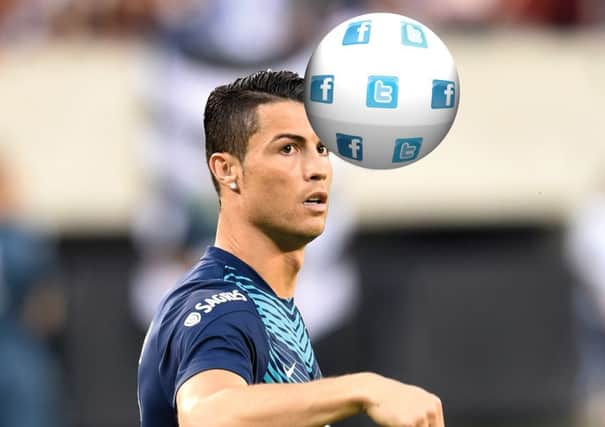Watching the social media ball this World Cup


AS IF they didn’t have enough to worry about on the pitch, every player, coach and official involved in the World Cup tournament in Brazil now has to be concerned about what they do and say off the pitch.
The rise of social media and the ubiquity of smartphones with cameras will mean that all the participants in the World Cup will be under scrutiny as never before in the history of the tournament.
Advertisement
Hide AdAdvertisement
Hide AdNor will their actions and words be the subject simply of journalistic inquiry – sure, there will be reporters covering their activities, but it is likely to be the man and woman in the street who will catch them out should players stray from the straight and narrow.
Sometimes it will even be the players who will land themselves in trouble. Just one ill-considered post on Twitter or Facebook, for example, and a player might find his participation in the world’s greatest football tournament abruptly curtailed.
That’s why they should all heed the warning of Scottish sports law and employment law expert Graham Mitchell of Simpson and Marwick, solicitors. Be careful about your personal conduct, is his message, and be very careful indeed when using social media .
“Sponsors, Fifa and their own national associations would all have a strong view if there was a Twitter message by a player that is not accordance with the values and policies of these bodies,” says Mitchell.
“The fact you are representing your nation – and not just your club – in a global event increases the risk.
“Often players get intotrouble because of their ill-judged attempts at humour. These are just young men – they could easily stray into making remarks that could be construed as racist, sexist or homophobic, for example.
“Players need to take on board the need to avoid causingoffence on a whole range of topics. As a starting point they should avoid subjects such as politics, sex or religion, but the issues may be even more subtle.
“All it will take is some derogatory remark, or even a player indicating that he likes a view expressed by someone else concerning Fifa’s current investigation into bribery allegations, or on Brazil’s favela “pacification”, and this could start a political storm. An ill-judged re-tweet could be costly.”
Advertisement
Hide AdAdvertisement
Hide AdSocial media is so important these days because of the vast number of people following their idols – Lionel Messi ofBarcelona and Argentina has more than 58 million fans on Facebook, but he is well behind Cristiano Ronaldo of Real Madrid and Portugal, who has more than83 million followers onFacebook and 27 million followers on Twitter.
Some marketing experts say that this World Cup will see some players break the 100-million-followers mark on Facebook, and that will hugely improve their income from sponsorship – halfof Ronaldo’s estimated£26 million income last year came from endorsements.
Yet it could all easily go pear-shaped with one wrongword – as happened to Ashley Cole of Chelsea and England who was fined £90,000 by the English FA for a tweet insulting the body. Some pundits have speculated that the tweet might even have cost Cole his place in the England squad for Brazil.
Mitchell has some sympathy for players who are often encouraged by their clubs(and sponsors) to use social media as a marketing tool. He accepts that social media is something that players increasingly use and he does not want to see them avoid Twitter or Facebook, not least because it keeps fans informed.
“It would be unrealistic to ask players to avoid using social media for the duration of the World Cup. Players can and will use Twitter, but they must be aware of the policies and values of their national associations, sponsors and FIFA. If they cannot comply with these, then they should avoid social media. There have been plenty of examples of footballers thinking they are being smart or funny and it often ends with them having to make all sorts of apologies, or worse, ending up facing disciplinary sanctions and being punished by their club.
“If the offence involved a one-off event or just one game between two clubs it would be bad enough, but this is the World Cup and the sheer number of nations involved means that it is inevitable that someone will make a mistake on social media that they will come to regret.”
• Graham Mitchell is a solicitor and is accredited by The Law Society of Scotland in Employment Law. He advises on sports law and discrimination law and is part of Simpson & Marwick’s sports law group. The group represents clubs, associations, managers, agents and competitors across a range of sports. Mitchell’s twitter account is@gsmlawyer